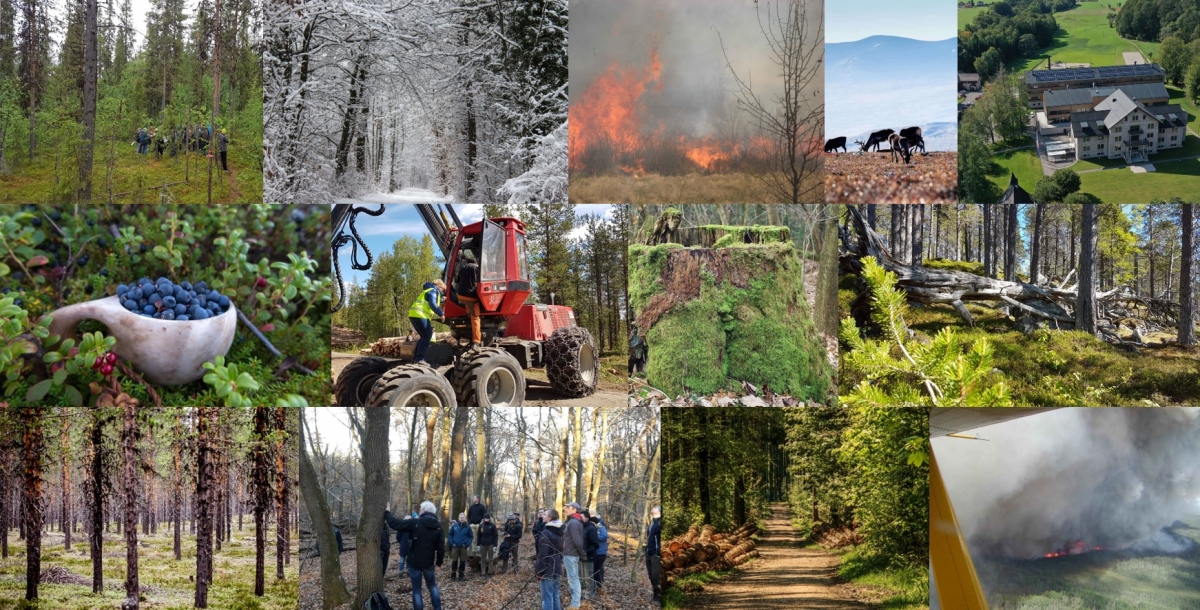Conflicting demands in European Forests
You are here


International on-site postgraduate course
Forest Management and Biodiversity across Europe
To be announced
Location - to be determined

Scope
Europe’s forests represent a large variety of ecosystems, from Mediterranean evergreen and temperate, deciduous forests through to coniferous boreal forests. Depending on a variety of factors, these forests harbour high levels of biodiversity, generated primarily by variations in climate and topography, but also to large extent through differences in forest management. In Europe, the majority of forests have been managed during past millennia. A large variety of land tenure and governance systems, management styles and forest uses have transformed European forests by changing their extent, structure, species composition and function. Currently, forests and other wooded lands cover almost 40% of the continent, or 227 million hectares (Forest Europe 2020), and host a tremendous variety of organisms. European Forests are crucial for a major part of continental biodiversity.
To protect habitats and species while also meeting its international commitments, the European Union (EU) has been developing the Natura 2000 network of protected areas, based on the 1979 Birds Directive (on the preservation of wild birds) and the 1992 Habitats Directive (on the conservation of natural habitats). The main goal of the Natura 2000 network is to protect the EU’s threatened species and habitats by setting conservation objectives, delineating protected sites and monitoring the conservation status of these sites. The network now includes almost 30,000 protected areas covering 18% of the EU’s land area, of which 48% is forested, and 8% of its marine territory (EEA 2019). According to Natura 2000-reporting, forests exhibit the highest proportion of improving trends among the assessments, with 14% of the forest assessments having a good conservation status. However, 31% of forest assessments still show a bad conservation status and 54% a poor conservation status (EEA 2019). This suggests that European forests have not escaped the global trend of biodiversity loss, and one of the targets of forest management is to increase biodiversity to improve this.
Connected to this, the EU has recently launched the Restoration regulation, aimed at improving the situation. This builds upon the Biodiversity Strategy which aims for 10% of all lands under strict set aside. In addition, the Commission’s Green Deal aims for protection of 30% of the land ecosystems. These current developments underline the relevance and timeliness of the course subject.
Improving biodiversity may be achieved through a variety of measures: from strict protection and set asides, to closer to nature management forms and more integrated approaches, characterizing land sparing and land sharing options. European forests have a central role to play in biodiversity conservation, as is recognized by recent publications and policy documents. But how to solve conflicting issues locally and regionally, taking into account local demands and stakeholders, remains a problem.
Course set-up (last edition)
The course starts on Sunday with welcome drinks and lunch, followed by an opening lecture about the general theme and aims of the course and introductory poster pitches by the participants. During the week, there will be lectures and Masterclasses in the mornings on specific topics by experts of the partner institutes and from outside. Lectures will cover all interdisciplinary aspects related to forests, forest management, and biodiversity conservation in Europe. These can relate to ecological aspects, but also to social and sustainability aspects, as well as economics, integrated management, and governance.
In the afternoons, participants will work in small teams on a specific group work assignment. This will allow participants to link their theoretical knowledge with real-life challenges, aimed at finding solutions for the issues of our times! The experts will be present for most or all of the course to interact with the participants, to provide topical masterclasses and workshops, and to provide input for the group assignment. During two afternoons, the Białowieża National Park and the Białowieża forest will be visited with local guides.
In the evenings, there may be leisure lectures by invited speakers or local stakeholders, and possibly wildlife spotting excursions. On Friday, there will be no official program (see below). Then, on Saturday, the group projects are finalised and presented. On the last morning, the course is concluded by general discussion of the theme of the course, including a general wrap-up of the course and evaluation of the course aims. Finally, after a goodbye lunch, all can make their way home.
Preliminary lecture topics
A detailed programme can be found here.
Course Organisers
- Prof. Frits Mohren, Forest Ecology & Management, Wageningen University & Research, the Netherlands
- Prof. Gert-Jan Nabuurs, Forest Ecology & Management, Wageningen University & Research, the Netherlands
- Dr Szymon Bijak, Department of Dendrometry and Forest Productivity, Warsaw University of Life Sciences - SGGW, Poland
- Dr Claudius van de Vijver, the Graduate School Production Ecology and Resource Conservation (PE&RC), the Netherlands
- Drs. Miriam van Heist, the Graduate School Production Ecology and Resource Conservation (PE&RC), the Netherlands
General information
| Target Group | The course is aimed at PhD candidates, postdocs and other academics |
| Group Size | Min. 15 / Max. 30 participants |
| Course duration | To be determined |
| Language of instruction | English |
| Frequency of recurrence | Every two years |
| Number of credits | 2.5 ECTS |
| Lecturers | To be determined |
| Fee | To be determined |
| Location | To be determined |
More information
Miriam van Heist (Graduate School PE&RC)
Phone: +31 (0) 628521546
Email: miriam.vanheist@wur.nl
Registration
At this moment, this course is not scheduled yet. However, if you register your interest in this activity below, we will inform you as soon as the course is scheduled and registration of participation is opened.
